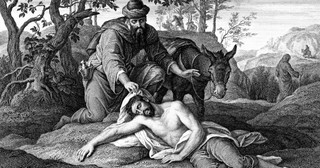Judas Betrays Jesus - Bible Story
Share
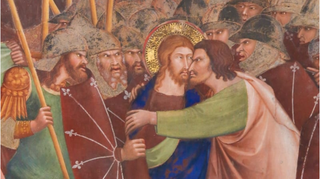
The Bible Story of Judas Betrays Jesus
The Bible Story of Judas betraying Jesus is found in all four gospels. This powerful story is well known in Christian theology as one of the most significant events of disloyalty. There are several explanations as to why Judas betrayed Jesus, including bribery and demonic possession, that vary among the gospel accounts.
The Gospels imply that Jesus anticipated and permitted Judas's betrayal. One interpretation is that Jesus allowed the betrayal because it would allow God's plan to be achieved and another that regardless of the betrayal, Jesus was eventually fated for crucifixion as part of God's plan.
During the meal of the Last Supper Jesus predicts that "one of you will betray me" referring to Judas. Judas leaves the supper and goes to the Roman authorities who are looking to arrest Jesus. He accepts a bribe of 30 silver and agrees to take them to Jesus. Judas knew that Jesus and the disciples would go to a garden near Jerusalem and led the soldiers there, stating "Whoever it is I kiss, he is the one; take him into custody, and lead him away under guard.” Leading the group into the garden, Judas sees Jesus with his disciples and approaches him. “Greetings, Rabbi!” Judas says, and he kisses Jesus very lightly. “Fellow, for what purpose are you present?” Jesus responds. (Matthew 26:49, 50) Answering his own question, Jesus says: “Judas, are you betraying the Son of Man with a kiss?”
As the soldiers move toward Jesus, the apostles recognize what is happening. “Lord, should we strike with the sword?” they ask. (Luke 22:49) Before Jesus can respond, Peter uses one of the two swords that the apostles have and attacks Malchus, a servant of the high priest, cutting off his right ear.
Jesus caresses the ear of Malchus, healing the wound. He then teaches an important lesson, telling Peter: “Return your sword to its place, for all those who take up the sword will perish by the sword.” Jesus is willing to be captured, for he explains: “How would the Scriptures be fulfilled that say it must take place this way?” (Matthew 26:52) This then leads to the trial and Crucifixion of Christ.
Why Is Judas Such a Tragic Character in the Bible?
Judas’ infamous betrayal of Jesus made him one of the best-known Bible characters of all time. Even people not familiar with the Bible reference him as an example of treacherous behavior. His reputation is even sadder when we consider what the Bible says about his time with Jesus.
Who Was Judas in the Bible?
Judas is first mentioned in Matthew 10:1, a list of the 12 disciples that Jesus gave special gifts to and became his closest companions. We know that several hundred people were following Jesus at any given time, and there were 72 disciples that Jesus sent out to do ministry (Luke 10). The 12 disciples were an inner circle within the 72, and some were apparently closer to Jesus than others. Peter, James, and John spent lots of individual time with Jesus, and the Gospel of John mentions “the disciple Jesus loved” several times. How close Judas was to Jesus isn’t clear. The Gospels don’t describe the scene where he met Jesus like it does for Peter or Philip. Given that Jesus often picked disciples by directly approaching them and saying, “follow me,” it’s possible that Judas was singled out by Jesus as a potential follower.
The Gospels also don’t give us any individual scenes of Judas with Jesus. Given that tradition holds that the Gospel of Mark is Peter retelling his memories to his student John Mark, that the Gospel of Matthew is written by Matthew the former tax collector, and that the Gospel of John is by the apostle John, that doesn’t necessarily mean Judas didn’t have one-on-one time with Jesus. The writers would have focused on retelling the big moments (the ones multiple Gospels mention as major events) and their personal memories (Peter recalling the Transfiguration, for example). Remembering when and if Judas hung out with Jesus may not have been a high priority for them.
This lack of references to Judas may also mean that Judas didn’t do anything out of the ordinary. He didn’t have massive fights with Jesus that everyone remembered after the fact. He didn’t do anything so cool that everyone remembered as the “disciple most likely to succeed.” Matthew 10 says that all 12 disciples got spiritual gifts and preached, so Judas was doing what all the other disciples were doing. He apparently didn’t seem less spiritual or more rebellious—he was one of the boys.
The fact that Judas didn’t stick out as a rebel or traitor becomes clear if we look at the Last Supper. Mathew 26, Mark 14 and John, all agree and say that when Jesus told the disciples that one of them would betray him, no one singled out Judas. Instead, they all said, “Surely you don’t mean me?” (Mark 14:19). Peter even asked someone else to ask Jesus who he was talking about (John 13:24). Even when Jesus identified Judas as the betrayer and he left, the other disciples thought something more innocent was going on (John 13:27-30).
Why Did Judas Betray Jesus?
The Bible doesn’t take us directly into Judas’ mind or have any scenes where he makes a defense for his actions. This means that it’s hard to say exactly what he thought of Jesus when he started following him, and what changed that made him decide to betray him.
We do know that Jesus told his disciples in John 6:64-70 that he knew some of them did not believe, and even said one of them was a devil. This condemnation suggests that there was something fundamental about Jesus’ message that Judas missed. Perhaps he didn’t believe Jesus was the Messiah, he just went along for the ride to gain influence as Jesus acquired power and fame. Given that people tried to kill Jesus several times, Judas must have felt he had something big to gain from being with Jesus, something worth the risk. Maybe he thought, as the other disciples seemed to think, that the Messiah was going to free Israel from Rome (Acts 1:6), setting himself up as king. When it became clear that Jesus wasn’t doing the things that a political champion would do (coming into Jerusalem on a warhorse, killing Romans), Judas may have reconsidered who he was getting behind.
The one moment we do get a look into Judas’ motivations is when he rebuked Mary for pouring perfume on Jesus. The writer says that Judas was only upset because had Mary sold the perfume for the group, he would have accessed the proceeds and taken some for himself (John 12:6). Jesus told Judas to leave Mary alone, and after that incident, Judas met with the religious leaders and accepted money to betray Jesus. This scene indicates that Judas was benefitting financially from being around Jesus, and may have been concerned that Jesus knew about his theft.
It’s also interesting to note that Judas was guilt-stricken when Jesus was condemned to be crucified (Matthew 27:3-10). Given that the religious leaders accused Jesus of blasphemy, which traditionally meant death by stoning (Leviticus 24:16), Judas almost certainly knew things wouldn’t end with Jesus “cutting a deal” and walking away alive. He may have been shocked that the leaders got the Romans to kill Jesus by crucifixion. Pilate was confused at the people’s request (Luke 23:1-56) (John 19:4-6) since the Romans didn’t administer punishments for religious disputes. Given that Judas had spent years traveling with Jesus, he may have felt the sheer emotional weight of what he had done, seen it in light of all the time he’d spent with this man. Regardless, it’s clear that Judas wasn’t a sociopath who felt no responsibility for what he’d done. At some point, he realized the reality of his actions and was heartbroken by it.
Why Is Judas' Life So Tragic?
Obviously, betraying someone who turned out to be the Messiah is a terrible thing. However, we don’t always think about what Judas actually had to do as one of Jesus’ followers or what led up to that, factors that made his betrayal all the more tragic.
Judas would have given up a lot to follow Jesus. Scholars estimate that Jesus spent around 3 years doing ministry before his death. He didn’t get all his disciples at the very start (they’re not mentioned at the wedding in Cana), so we don’t know exactly how much of that time Judas was with him. Still, it was likely months, possibly over two years, that Judas spent roaming around Israel with Jesus. Like Peter, Matthew, and other disciples, he would have left his home and his profession to do this. It was clear from the start that Jesus didn’t have many credentials: he wasn’t a trained priest or Pharisee. He didn’t come from an influential or respected town (John 1:46). His big recommendation was from another itinerant teacher, John the Baptist…who was executed by the authorities. So, like all the other disciples, Judas “gave up everything” (Matthew 19:27) to follow Jesus, with no clear reasons to believe this would pay off. Despite taking all those risks, Judas threw it all away when he betrayed Jesus.
On an even more tragic level, Judas did this despite various warnings. When Jesus appointed the 12 disciples, he warned all of them to watch out for Satan (Matthew 10:28). At a major event where many followers left because they couldn’t get behind Jesus’ teaching, he warned them that one of them was “a devil” (John 6:70). At the last supper, Jesus told everyone that things would be terrible for the betrayer, that it would be better if he had never been born (Mark 14:21). Whether or not Judas could have reconsidered then, and something else would have happened to bring about Jesus’ death, is hard to say. That question depends a lot on what we think it means that Satan “entered into” or “enabled” Judas. Still, Judas was told in a public setting what the consequences would be. Later at the Garden of Gethsemane, Jesus seems to prod Judas to consider what he’s doing (Luke 22:48). Judas had multiple opportunities to think about his actions, and still chose to betray Jesus.
How Can We Learn from His Mistakes?
While hopefully none of us will find ourselves in a position like Judas, we can all learn a few things from his behavior:
Consider carefully our motivations. Whether it was about money, a different idea of what the Messiah was supposed to be, or something else, Judas’ motivations for following Jesus were tainted. We all need to take time to ask what we really want in a situation, whether we have selfish motivations that we are hiding (and maybe not admitting to ourselves).
Consider what will happen in the end. In the same way, we must recognize our selfish motivations, we must ask whether what we want will lead to something good. Eugene Peterson observes in Letters to A Young Pastor that everything the devil offered Jesus in the desert looked good but conflicted with Jesus’ end goals. Similarly, what the devil offered Judas looked good—a chance to shut up someone who might expose his criminal behavior—but the end showed that it was terrible. As we walk with God, we must seek his help to develop a long view of things, and consider where our plans will end.
Recognize past performance doesn’t make us perfect. We tend to avoid the idea that we could make big mistakes in the future. Many of us like to cite past track records as proof that we’ll keep doing great. Judas was part of Jesus’ inner circle and apparently did all right, and he still fell. As long as we are on this side of heaven, we will be fallible human beings who can fail. Therefore, we always need God’s grace to see what we can do better, what needs fixing.
Read the full story of Judas Betrayed Jesus in scripture text below and find Articles, Videos and Audio Sermons relating to this enlightening story.
Photo credit: San Gimignano, Italy: Judas betrays Jesus with a kiss, 14th Century Fresco in the Collegiata of San Gimignano










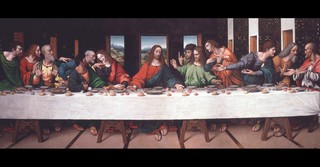

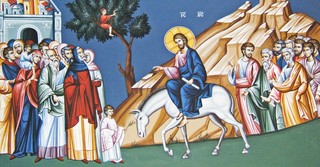



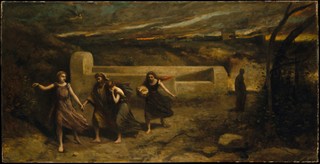
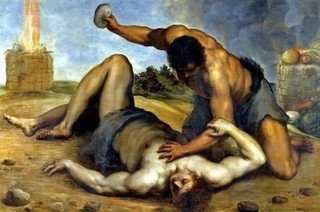
.800w.tn.jpg)


